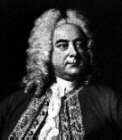 Born
1685 in Halle a.d. Saale, which is in Saxonia. I like him, though ;), or rather,
his music.
Born
1685 in Halle a.d. Saale, which is in Saxonia. I like him, though ;), or rather,
his music.He was 17 when he got his first job as an organist. Soon after he went to Hamburg to play the cembalo at the opera. Having travelled and worked in Italy for two years, he was employed as Kapellmeister at the court of Hannover in 1710 and settled in London in 1712 where he came to work for the royal court. From 1720 to 1728 he was manager of of the Royal Academy of Music, for which he composed most of his Italian operas. In his later days, he concentrated on oratorios and organ music.
Hðndel's music was a synthesis of German, Italian, French and English influences. Having a good command of all the stylistic tools and musical rules of his age, he used them masterfully to create music that was once tender and birdlike, then belligerent and pompous or deeply sad. The melodies go straight into the ear and won't come out for hours - had there been charts then, they would have been smash-hits. Is there anybody who doesn't know the Haleluja choir? Actually, I like For unto us a child is born much better han the Haleluja. Less pompous, but much more elegant... and symmetric. Consider how the four voices (Soprano, Alto, Tenor and Bass) interact with each other.
Hðndel died in London in 1759, a date to be remembered: He was the
last great composer of the Early Music Age, and many people consider 1759 to be
the end of the EM era.
For a first treat of Hðndel's instrumental music, I recommend the Music
for the Royal Fireworks and Water Music, and Messiah
for vocal music. All three are available on a wide variety of labels. My favourite
operas are Giulio Cesare in Egitto, available e.g. on Harmonia
Mundi HMC 901385.87, and Serse, of which I haven't found any
good recording yet, but the Serse aria (Ombra mai fu, best known
as "the Largo" and a funeral favourite), some from Cesare and others
are in the MIDI archive
If you want to know when and where Hðndel music is performed, go
to Dave Hall's
database.